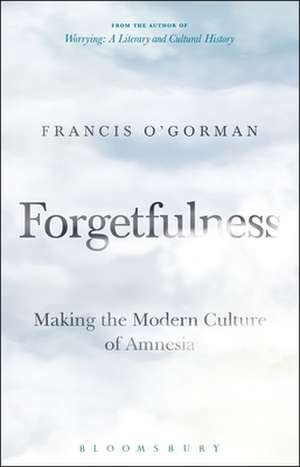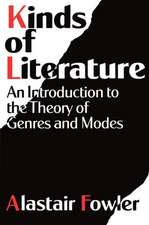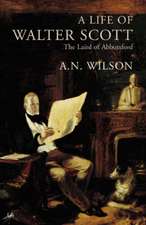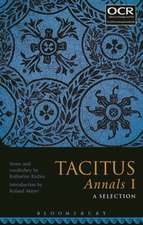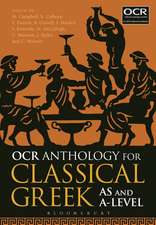Forgetfulness: Making the Modern Culture of Amnesia
Autor Professor Francis O'Gormanen Limba Engleză Paperback – 5 feb 2020
| Toate formatele și edițiile | Preț | Express |
|---|---|---|
| Paperback (1) | 71.46 lei 3-5 săpt. | |
| Bloomsbury Publishing – 5 feb 2020 | 71.46 lei 3-5 săpt. | |
| Hardback (1) | 95.94 lei 3-5 săpt. | |
| Bloomsbury Publishing – 4 oct 2017 | 95.94 lei 3-5 săpt. |
Preț: 71.46 lei
Preț vechi: 115.85 lei
-38% Nou
Puncte Express: 107
Preț estimativ în valută:
13.67€ • 14.90$ • 11.52£
13.67€ • 14.90$ • 11.52£
Carte disponibilă
Livrare economică 02-16 aprilie
Preluare comenzi: 021 569.72.76
Specificații
ISBN-13: 9781501362064
ISBN-10: 1501362062
Pagini: 200
Ilustrații: 1 b/w illustration
Dimensiuni: 140 x 216 x 34 mm
Greutate: 0.27 kg
Editura: Bloomsbury Publishing
Colecția Bloomsbury Academic
Locul publicării:New York, United States
ISBN-10: 1501362062
Pagini: 200
Ilustrații: 1 b/w illustration
Dimensiuni: 140 x 216 x 34 mm
Greutate: 0.27 kg
Editura: Bloomsbury Publishing
Colecția Bloomsbury Academic
Locul publicării:New York, United States
Caracteristici
Follow
up
toWorrying:
A
Literary
and
Cultural
Historythat
delves
further,
but
from
a
different
perspective,
into
many
of
the
major
themes
of
that
book,
particularly
the
modern
and
contemporary
obsession
with
the
future
and
how
this
might
be
damaging
at
both
an
individual
and
a
cultural
level
Notă biografică
Francis
O'Gormanis
Saintsbury
Professor
of
English
Literature
at
the
University
of
Edinburgh,
UK.
He
is
the
author
or
editor
of
23
books,
includingWorrying:
A
Literary
and
Cultural
History(Bloomsbury,
2015).
He
is
currently
working
on
three
separate
projects:
on
Yeats,
on
London,
and
on
Emily
Brontë.
Cuprins
Introduction1.
Cultures
of
Memory2.
The
Making
of
Modern
Forgetting3.
Contemporary
Cultures
of
Amnesia4.
Forgetfulness
in
Contemporary
Cultural
Narrative5.
Learning
Pasts6.
The
Problems
of
Forgetting
National
and
Local
HistoriesAcknowledgementsReferencesIndex
Recenzii
Offers
a
piercing
insight
into
the
modern
era's
fascination
with
newness
and
the
resulting
cultural
implications.
From
a
professor's
perspective,
I
know
that
I
have
read
a
book
worth
my
time
and
effort
when
I
find
it
transforming
how
I
see
my
daily
life.Forgetfulnessis
such
a
book
.
full
of
insightful
points
and
crucial
discussions
of
the
relationship
between
lost
cultural
memory
and
the
modern
habit
of
forgetting.Forgetfulnessis
an
insightful
exploration
of
an
ephemeral,
amnesiac
modernity
that
both
warrants
careful
examination
and
inspires
lingering
thought.
Crisp and elegant . Cultural memory, [O'Gorman] argues, shapes our sense of time and connectedness to one another on a local and global level. By "winding down the portcullis" on the past, we risk closing our minds.
A book as acutely intelligent and as original as this is a rare gift of fortune. Read it and you will not easily forget what you have learned.
[A]n engaging dissection of an important phenomenon.
[This] provocative and engaging little book should be read as a personal essay ... [O'Gorman] manages to be both erudite and accessible, which is something of a feat.
After a glut of books about mindfulness it came as something of a relief to encounterForgetfulness. the book is supremely intelligent, but with the knowledge worn lightly and it's eminently readable, regardless of how you feel about the conclusions he draws . a book to be savoured and considered.
What is wrong with the modern world? Why does life seem so pointless, anxious and annoying? For Francis O'Gorman, the answer is pleasingly simple: we have lost touch with the stability of traditions from the past, and now live in a state of constant, confusing flux ... O'Gorman is at his best when he writes about literature, which is not always the case with literary critics ... At his best Prof O'Gorman sounds, perhaps not surprisingly, like an inspired young John Ruskin reminding his readers that they needed to pay more attention to their heritage before it vanished forever and they are left in an ugly, utilitarian world fit to serve material rather than spiritual needs.
An ambitious, often engaging argument.
Carrying his learning lightly, Francis O'Gorman elegantly enquires into the reasons why the 21st century is losing touch with the past. History, he argues, has become a mere commodity, emptied of meaning by commercial choices, ideological sleight of hand, cultural theories and educational decisions. In these post-truth days he challenges us to reconnect with the past, actively and analytically, in order to restore the links between sense and meaning, language and reality, and to reestablish the authority of the past. No nostalgist, O'Gorman speaks for history. This is not a hymn to the past, but a call critically to recall it. At a time of migration and globalization, he rediscovers the home of memory.Forgetfulnessis for anyone who wants to remember what it is like to read an intelligent and provocative book.
Forgetfulnessbrilliantly diagnoses the cultural Alzheimer's disease from which modern man so complacently suffers, to the great detriment of his character. O'Gorman makes a strong plea for the importance of cultural memory and, above all, for a healthier and less narrowly self-referential historiography.
Crisp and elegant . Cultural memory, [O'Gorman] argues, shapes our sense of time and connectedness to one another on a local and global level. By "winding down the portcullis" on the past, we risk closing our minds.
A book as acutely intelligent and as original as this is a rare gift of fortune. Read it and you will not easily forget what you have learned.
[A]n engaging dissection of an important phenomenon.
[This] provocative and engaging little book should be read as a personal essay ... [O'Gorman] manages to be both erudite and accessible, which is something of a feat.
After a glut of books about mindfulness it came as something of a relief to encounterForgetfulness. the book is supremely intelligent, but with the knowledge worn lightly and it's eminently readable, regardless of how you feel about the conclusions he draws . a book to be savoured and considered.
What is wrong with the modern world? Why does life seem so pointless, anxious and annoying? For Francis O'Gorman, the answer is pleasingly simple: we have lost touch with the stability of traditions from the past, and now live in a state of constant, confusing flux ... O'Gorman is at his best when he writes about literature, which is not always the case with literary critics ... At his best Prof O'Gorman sounds, perhaps not surprisingly, like an inspired young John Ruskin reminding his readers that they needed to pay more attention to their heritage before it vanished forever and they are left in an ugly, utilitarian world fit to serve material rather than spiritual needs.
An ambitious, often engaging argument.
Carrying his learning lightly, Francis O'Gorman elegantly enquires into the reasons why the 21st century is losing touch with the past. History, he argues, has become a mere commodity, emptied of meaning by commercial choices, ideological sleight of hand, cultural theories and educational decisions. In these post-truth days he challenges us to reconnect with the past, actively and analytically, in order to restore the links between sense and meaning, language and reality, and to reestablish the authority of the past. No nostalgist, O'Gorman speaks for history. This is not a hymn to the past, but a call critically to recall it. At a time of migration and globalization, he rediscovers the home of memory.Forgetfulnessis for anyone who wants to remember what it is like to read an intelligent and provocative book.
Forgetfulnessbrilliantly diagnoses the cultural Alzheimer's disease from which modern man so complacently suffers, to the great detriment of his character. O'Gorman makes a strong plea for the importance of cultural memory and, above all, for a healthier and less narrowly self-referential historiography.
